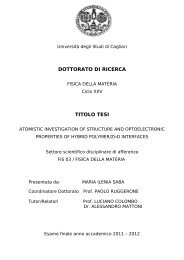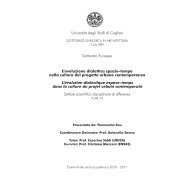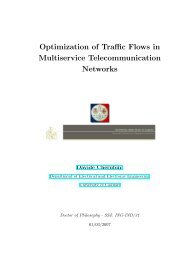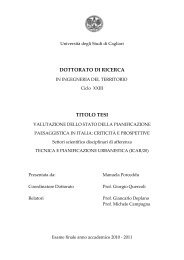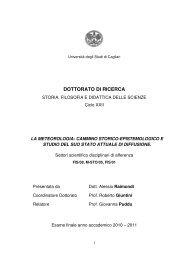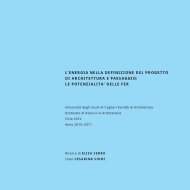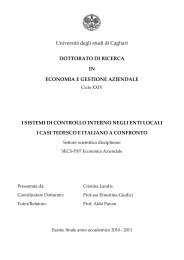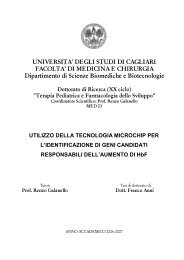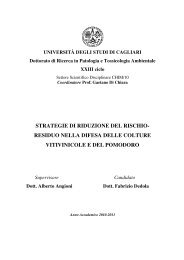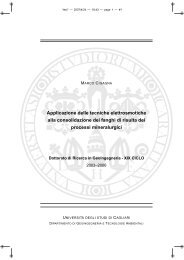The only truly alien planet is Earth. - UniCA Eprints - Università degli ...
The only truly alien planet is Earth. - UniCA Eprints - Università degli ...
The only truly alien planet is Earth. - UniCA Eprints - Università degli ...
You also want an ePaper? Increase the reach of your titles
YUMPU automatically turns print PDFs into web optimized ePapers that Google loves.
imando al terzo occhio delle filosofie orientali: resta da stabilire se l’immagine sovversiva<br />
batailleana, magari nella forma reichiana - ma non soltanto in quella, naturalmente - dell’oggetto<br />
volante non identificato, debba essere classificata tra quelle prive di relazioni concrete con la realtà<br />
oggettiva oppure tra quelle che rimandano a una realtà trascendente. Insomma, queste<br />
manifestazioni sono fantastiche - e perciò ascrivibili all’ascendenza art<strong>is</strong>tica, e letteraria in<br />
particolare) o sono reali - e perciò ascrivibili all’ascendenza m<strong>is</strong>tica e filosofica -?<br />
Come psicanal<strong>is</strong>ta Reich si allontana da Freud, respingendone la teoria della pulsione di<br />
morte, alla quale anche Ballard era poco propenso a credere. Inoltre, era convinto che ci fosse un<br />
nesso tra repressione sociale e repressione della sessualità. Anche questa posizione è la stessa di<br />
tanti scrittori, tra i quali lo stesso Ballard, Sade e Burroughs. Anna Freud riteneva che si potesse<br />
rafforzare l’ego <strong>degli</strong> individui stimolandoli ad attenersi scrupolosamente alle regole della società.<br />
Herbert Marcuse riteneva invece che ciò serv<strong>is</strong>se non a far emergere la parte migliore dell’essere<br />
umano ma, al contrario, che la repressione delle pulsioni negative le facesse emergere in maniera<br />
più d<strong>is</strong>truttiva. Mentre Sigmund Freud credeva che l’inconscio dell’uomo contenesse delle forze<br />
fondamentalmente negative, d<strong>is</strong>truttive, Reich riteneva che tali forze fossero fondamentalmente<br />
positive ma che ven<strong>is</strong>sero trasformate in negative dalla repressione. La sua posizione di radicale<br />
d<strong>is</strong>sidenza gli costò l’espulsione dall’Ordine <strong>degli</strong> psicanal<strong>is</strong>ti austriaci, avvenuta nel 1934, su<br />
pressione di Anna Freud, la sua più acerrima nemica professionale. Un personaggio come Reich è<br />
interessante come esempio della deriva verso l’interiorità - inner space - della controcultura di base<br />
scientifica. Un esempio complementare è dato dai Beatles che vanno in India alla ricerca di un guru,<br />
sintomo dell’ubriacatura pop per l’India e l’Oriente 124 .<br />
Carl Gustav Jung incarna un altro aspetto dell’interesse controculturale per l’Oriente, dalle<br />
radici ben più profonde, culturalmente <strong>alien</strong>o r<strong>is</strong>petto all’hype della pop music <strong>degli</strong> anni<br />
Sessanta 125 . La sua prospettiva è più ampia di quella di Freud, ingabbiata nei limiti dell’ortodossia<br />
scientifica alla quale voleva appartenere, al punto da voler indagare il pensiero esoterico e perfino<br />
l’alchimia, ritenuti anch’essi fenomeni collegati all’inconscio collettivo 126 . In ogni caso, la tensione<br />
Bataille can begin to read the image as subversive in its negotiation with the impossible. No longer confined to certain<br />
experiences, th<strong>is</strong> delirium of images spreads its effects across all images and all acts of v<strong>is</strong>ion, deranging v<strong>is</strong>ion from its<br />
position of truth.» Ivi, pp. 35-36.<br />
124<br />
«<strong>The</strong> resonances of “inner space” move across a highly diverse set of contexts; Robert Hew<strong>is</strong>on, in h<strong>is</strong> h<strong>is</strong>tory of the<br />
1960s, in fact uses the term as the (ultimately debilitating) orientation of the whole counter-culture in general. […]<br />
Ballard's catastrophe novels are inextricably intertwined with the intensification of eschatological thought contained in<br />
that much contested denotation of epoch: the Sixties.» R. Luckhurst, op. cit., p. 340.<br />
125<br />
«Jung's ‘Oriental<strong>is</strong>m’ was increasingly popular in the nascent counter-culture, with its importation of hol<strong>is</strong>tic Eastern<br />
‘mystic<strong>is</strong>m’.» Ivi, p. 343.<br />
126<br />
«Jung’s “fantasy of hol<strong>is</strong>tic origin, the undivided self” held particular purchase with certain counter-cultural readers<br />
in search of a sense of self in the 1960s, and the popularity of Jungian psychology over Freudian psychoanalys<strong>is</strong><br />
precipitated and accompanied a resurgent interest in eastern mystic<strong>is</strong>m, esoteric thought, alternative religions and the<br />
occult science of alchemy. <strong>The</strong> appeal of the Collective Unconscious for Ballard, however, <strong>is</strong> not as “a mystic<br />
entity”(emphas<strong>is</strong> Ballard’s), but as a fundamental component of the human condition [Graham Revell, ‘Interview with<br />
- 41 -



